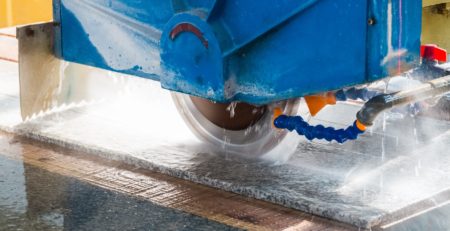A Guide to Stone Maintenance
One of the key benefits of choosing stone for your new kitchen worktop is how little maintenance this material requires. This isn’t to say, however, that your worktop will simply look after itself for decades on end. To keep your quartz, marble or granite surfaces looking as stunning as the day they were fitted, take a few simple and hassle free steps of basic maintenance.
Daily Habits
A great routine to establish which will have long lasting benefits for your stone worktop is to clean as you go. The longer the spills are left on your worktop, the more damage potential they accrue. So keep a soft cloth soaked in warm water handy while you prepare or cook. At the end of the day, a wipe down with basic anti-bac solution will ensure optimal hygiene and drying the surface down with a microfibre cloth will maintain surface shine.
Quartz Tips
Quartz is a mix of natural stone and engineered resin, so it is extremely non-porous. However, avoid using abrasive cleaning tools or using knives directly on the surface. Scratching to the surface can happen so it is wise to take steps to avoid this happening. Some more engineered surfaces such as dekton are so strong that it can actually damage knives. So using a chopping board actually protects your cookware!
Marble Tips
Naturally strong, marble does still possess some level of porosity. It will be sealed on installation so it is important to maintain the health of that sealed surface. Warm water or a ph-balanced cleaning solution will avoid damage to the seal. So the key to this surface is prompt attention to spills. Avoid leaving liquids and food detritus lingering on the surfaces as over time this can affect the seal and leave the underlying marble vulnerable.
Granite Tips
This is a similarly natural stone that benefits from the sealing process. So it is equally key to address spills promptly. However, what do you do when a food spill does solidify on the surface? Sometimes these things happen, after all. You can scrape up dried food residue before cleaning with warm water. However, ensure that you use a plastic spatula that won’t carry a risk of scratching to the sealed surface.
Things to Avoid
As we know, stone is extremely durable and heat resistant. So you don’t need to avoid contact with cookware. In fact, overzealous cleaning is more of a danger to your stone worktop than indulgent cooking! Steer clear of bleach or any products which contain an acidic ingredient, like lemon juice or vinegar as this could penetrate the seal and damage the stone.
Home Made Cleaner
If you have an empty spray bottle, you can easily put together a gentle cleaning solution out of every day items that you may already have in your kitchen! This is great for all types of stone. Mix a small amount of surgical spirit with water and a few drops of washing up liquid. This is great for daily use when accompanied by professional long term maintenance.
Long Term Planning
After installation, a granite or marble surface will enjoy the protection of the sealing process. However, one of the reasons that you chose stone is for its longevity. So it is likely that there will come a time, normally every five years or so when your worktop would benefit from being resealed. But how do you know if it’s needed? A simple way to test this is to leave a few drops of water on the surface. If the water appears to be spreading rather than beading up, it’s probably time to reseal your worktop.
In a kitchen there are always unforeseen events: cooking projects that go wrong, spills that have to wait. However, the best thing that you can do to maintain your stone worktops is to address spills promptly for most of the time. Prevention is, after all, better than cure!











